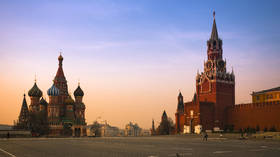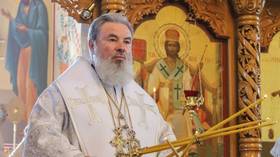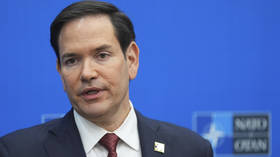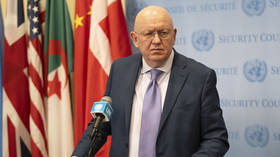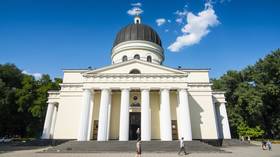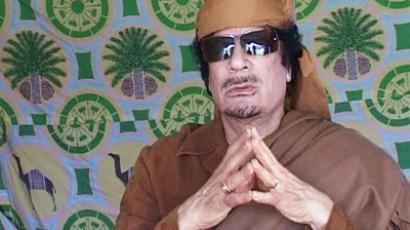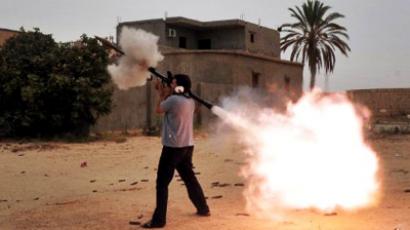Liberated Libya: No offence, it's just business
Many Libyans are celebrating Gaddafi's death and Western leaders are hailing a transition to democracy. However, that outcome is not inevitable. While NATO is now expected to end its bombing of Libya, their business there is just beginning.
Hillary Clinton paid a surprise visit to Tripoli a day before the killing of the ousted Libyan leader. There she was quoted as saying that the US hopes to see Gaddafi killed or captured soon.The captured scenario might have put Gaddafi in the toppled Egyptian leader’s shoes, or those of Iraq’s Saddam Hussein. But a trial over Colonel Gaddafi would have, no doubt, stirred even more controversy.“The death of Gaddafi was very convenient for the big European powers, for the West,” Asia Times correspondent Pepe Escobar told RT. “He would spill the beans about all the dirty deals. There are the stuff [sic] – a real politics – between the West and a developing country like Libya. Nobody wanted that.”Libyan transitional government officials say Colonel Gaddafi was cornered in a drain underneath a road in open countryside, near the city of Sirte. “Please, don’t shoot!” was allegedly heard at the site. Many point out similarities to the capture of Saddam Hussein. He was discovered in a small, underground hole, concealed next to farm buildings near his hometown.But unlike Saddam, who was captured alive by US forces, Colonel Gaddafi was reportedly shot dead by Libyan transitional authorities, aided by the US. A defense official claimed a US predator drone along with a French fighter jet hit Gaddafi’s convoy Thursday morning as they were trying to escape, effectively handing them over to the Libyan forces on the ground. “There are still unanswered questions about what happened to Colonel Gaddafi, ‘How was he killed? How did he die?’” says Middle East expert Edmund Ghareeb. “But clearly, I think, were it not for external intervention in Libya by all of NATO, the rebels in Benghazi may not have been able to achieve their objective.”NATO’s UN mandate was to protect Libyan civilians but it quickly became to get rid of Gaddafi and prop up a government, which is now in power – only thanks to the support of the allied forces. “And I think we’ll see not a new democracy in Libya, but a new reorganization of the Libyan political and economic institutions to the benefit of those who brought the National Transitional Council to power,” said. “It will be for the benefit of the United States’ oil companies, for the benefit of the British, and the French, and perhaps the Italian oil companies. They are the big winners here.”In the meantime, Western leaders are celebrating Libya’s transition to democracy. “Without putting a single US service member on the ground – we achieved our objectives,” said US President Barack Obama.What the US president did not mention in his celebratory speech was scores of Libyans killed in NATO strikes. Widespread violations of human rights are reported in today’s Libya. “There is no water there, no medication, they don’t have even oxygen in the hospitals,” an eyewitness of NATO atrocities in Libya, Ali Alkasih, told RT. “I have seen the situation in Sirte, I can assure you it is a disaster. It is a catastrophe.”Libya is now brimming with weapons. Experts say extremists have most likely got their hands on the vast armories left untended.As for Libya’s transition to democracy, the people now in power there have not been chosen by the Libyan people. And many Libyans fear that when the time comes to vote, the choice will have already been made for them.
‘Libya’s gruesome next chapter is mob rule’
Frankfurt-based political analyst William Engdahl told RT that Gaddafi’s death does not at all mean that the road to peace, justice, and democracy has been cleared in Libya.“I don’t think at all this means peace,” he said. “What we a seeing is the gruesome next chapter in what is going to be a mob rule in that country of different tribal groups, competing for power and oil control. I think that Libya is in for a period of horrendous chaos after the NATO bombing that brought parts of Libya back to the Stone Age.” Engdahl believes that this, as he puts it, “case of cold-blooded murder” of a man, who was wounded and practically defenseless, will at least put some pressure on the NTC.“The way it was done just gives an idea of what the moral values is of this new regime in Libya, and it certainly not a step forward,” he said.Engdahl says all of this was predictable from the very beginning, considering the West’s interest in Libya.“And this was predictable from the beginning, when the Pentagon started training these activists and secretly arming the insurgents back over a year ago,” he said. “It is interesting how all these arch-criminals, opposed to the Pentagon, come to court trial and then suddenly die before they get a chance to have justice.”
‘Gaddafi’s end is a message for other strongmen’
The way Colonel Gaddafi ended up in a fight against NATO gives a clear idea that Western powers are more than prepared to break any international law to get what they want in the Middle East – namely its resources, suggests British journalist Afshin Rattansi. “The message is clear to any dictator around the world – get lots of WMDs! If you don’t have them, we’ll contravene any international law, we’ll use whatever means necessary for our economic interest”, that is what the NATO and its allies are saying in Libya, argues the journalist and author. The international rights organizations are yet to investigate whether the toppling of Gaddafi regime was within the law. But the game is over there, and Libyans will soon get to know what they have obtained by killing their leader – and that is capitalism, believes Rattansi. Libya, a very rich country with a relatively small population, had the highest life expectancy on the continent under Gaddafi. It also had a free healthcare system, the lowest mortality rate in Africa, the highest GDP per capita. Now, as the new liberalism is brought to Libya, the Libyan population will learn what it means to live in a capitalist country, the writer forecast.



